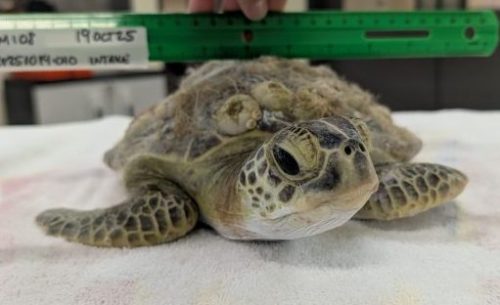

When it comes to our sea turtle patients, we usually share stories of recovery: mended flippers, healed carapaces and the joyous return to the ocean. But working in wildlife rehabilitation, there are some days when tragedy strikes. Sometimes a small turtle comes to our Sea Turtle Healing Center that steals the hearts of our animal care teams, and despite our best efforts, we can’t save the patient.
Newman was a small green sea turtle with big eyes that made our staff veterinarian Dr. Rachel Turner’s heart melt. But Newman had some ugliness beneath the surface. Newman came in with a painful blockage in his intestines. Our veterinary care team gave him multiple treatments, including enemas, a feeding tube, and as much supportive care as possible. However, after less than two weeks in our care, Newman ultimately succumbed to his injuries.
It was only upon Newman’s necropsy when the true cause of his death came to light. This turtle died because he ate a large piece of plastic in our waterways, and it blocked his intestines.
This is a case our veterinary team is presented with often: an otherwise healthy sea turtle comes into our care with a preventable life-threatening injury, such as internal damage from consuming plastics or being hit by a boat. Human impact is the number one cause of sea turtle population decline globally. Plastic pollution, habitat destruction, derelict fishing gear and climate change are all heavily impacting sea turtles and other marine life, and our team sees the direct effects every day. While there are days in our hospital filled with sadness, there is also an energy that comes with the realization that there is work that can be done to help solve these problems.
Newman is a reminder that everyday actions can have ripple effects through our fragile ecosystems. Plastic is a common culprit for sea turtles to mistakenly snack on because the longer it spends in the water, the more it can look and smell like a sea turtle’s favorite snack: jellyfish. By limiting plastic use, carrying in what you carry out and cleaning up our beaches, we can help protect our vulnerable marine life and preserve at-risk habitats for future generations.
Ways to Help
Together, we can prevent tragedies like Newman’s and continue to protect this incredible species.
Have you found a sea turtle that needs help? Visit this page or call the Sea Turtle Preservation Society at 321-206-0646. Want to help the Sea Turtle Healing Center? Support our Zoo, or view our Healing Center’s wishlist.
We would like to thank the following generous donors for supporting our mission-based programs:
Flammio Financial Group · Stifel- Garvin Wealth Management Group · Artemis IT · Pepsi Bottling Company · Amazon · PCL Construction | Nassal | MEC | Heard